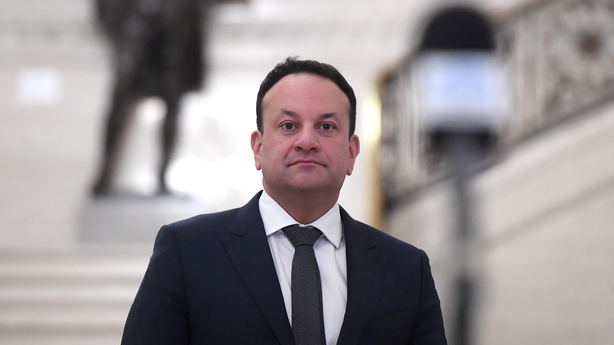Taoiseach Leo Varadkar has said that a complement of 15 diplomats should be enough for Russia's embassy in Ireland.
The number of staff members at the embassy on Dublin's Orwell Road has fallen to 14 compared with 30 accredited diplomats and administrative staff before the Russian invasion of Ukraine in February 2022.
Mr Varadkar was responding to a complaint by the Russian embassy that the Department of Foreign Affairs was blocking visa and accreditation requests in order to reduce staffing levels at the embassy.
Speaking at the Munich Security Conference, Mr Varadkar said 15 diplomats was "a pretty large embassy".
"And we think that should be adequate for their needs here," he told reporters.
The Irish Times reported last weekend that there was a standoff between the Government and the embassy over visas and accreditation, quoting an embassy spokesman as saying that the Department of Foreign Affairs was carrying out an "unacceptable visa and accreditation policy".
EU's defence responsibilities may broaden - Varadkar
Seperately, Mr Varadkar said the European Union may have to take on more of its own defence responsibilities in light of US presidential candidate Donald Trump's threat to reduce America's security commitment to Europe.
However, the Taoiseach said security should also be measured in overseas development aid and helping to deal with the causes of conflict, as well as in counterterrorism and fighting cyber crime.
Ireland, he said, was one of those countries whose overseas development spend was higher than its military spending.

Speaking at the Munich Security Conference, the Taoiseach said: "As Europeans, we should never exclude the possibility that America could become isolationist again.
"That's happened in history [and] that never ends up well for Europe.
"So we need to at least prepare for the possibility that we have to be able to deal with issues on our own continent and in our own neighborhood on our own."
He said that when it came to defence spending, EU and NATO countries were already working towards spending 2% of GDP on defence.
However, he added: "We shouldn't just see defence and security as a function of military spending. So much of what we can do in the world can be around development aid, international assistance at dealing with some of those underlying causes of conflict."
EU defence commissioner role
Asked if Ireland would support the creation of an EU defence commissioner in the next European Commission, as has been suggested by officials working for Commission president Ursula von der Leyen, the Taoiseach said he would wait to see the details.
"I don't think she's proposing a European defense pact or a European army or anything like that, so it's important that people don't misunderstand what she is putting forward.
"I understand she's putting forward a commission position…which might be able to coordinate some of the things that we do in defence at a European level already."
He said Ireland was a member of EU battlegroups and a founder member of the EU’s structured cooperation on developing capabilities known as PESCO.
"So if it's in that space, I think there's merit to it, but we would need to see the details and see exactly what the role of this potential commissioner would be."
Ireland's 'evolved' neutrality
He said Ireland’s neutrality had "evolved".
Mr Varakar told reporters: "When it comes to the war in Ukraine, while we're militarily neutral we're not politically neutral.
"When it comes to conflict in the Middle East, our political position has been very clear too. So, the fact that we don't have a huge army and don't get involved in wars doesn't mean that we don't have a foreign policy, or security policies.
"A lot of what a small country like Ireland can bring to the table isn't military might: we're never going to be a major military power.
"But we can bring to the table things like peacekeeping, for example, like we do with the UN, cooperation on the EU level when it comes to issues like cyber."
The Taoiseach will take part in a panel discussion at the Munich conference tomorrow on the role that small, neutral countries can play in helping restore global stability.







